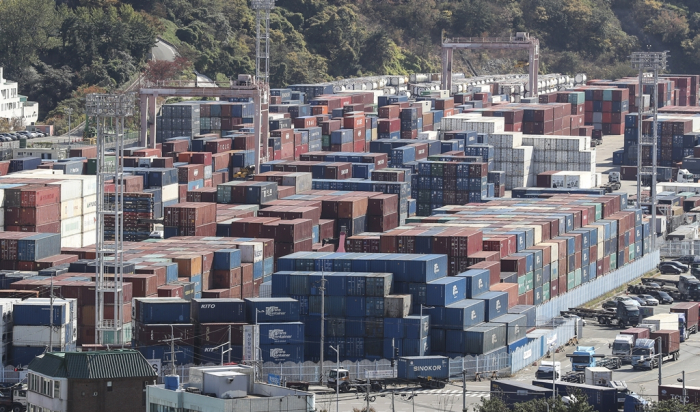Economy
Falling Korea current account surplus heightens economic woes
Korean firms’ overseas unit sales skid for the 1st time in nearly 2 years, indicating the global downturn has already hit the economy
By Nov 08, 2022 (Gmt+09:00)
1
Min read
Most Read
When in S. Korea, it’s a ritual: Foreigners make stops at CU, GS25, 7-Eleven


Maybe Happy Ending: A robot love story that rewrote Broadway playbook


NPS yet to schedule external manager selection; PE firms’ fundraising woes deepen


US auto parts tariffs take effect; Korea avoids heavy hit


NCSOFT invests in US game startup emptyvessel



South Korea’s current account surplus has shrunk on falling exports, adding to concerns over a slowdown in Asia’s fourth-largest economy amid a global downturn.
The country reported a current account surplus of $1.6 billion in September, far lower than $10.5 billion a year earlier, preliminary central bank data showed on Tuesday. Goods exports slid 0.7% to $57.1 billion, while imports jumped 18% to $56.6 billion.
South Korean companies’ sales from overseas units fell for the first time in nearly two years, indicating that the global economic slowdown has already bitten into the export-reliant economy. Net exports of goods under merchandising tumbled 30% to $1.5 billion on-year, logging the first slide since October 2020.
“The exports had been alright until the third quarter, but uncertainties grew on the sluggish IT sector and shrinking global demand,” said a Bank of Korea official.
The country’s total exports skidded for the first time last month, the clearest sign yet that the economy is in a severe downturn.
ENERGY IMPORTS JUMP AHEAD OF WINTER
In the first nine months of the year, South Korea logged a current account surplus of $24.1 billion in total, less than half of the $67.4 billion a year earlier.
That came as higher energy prices boosted the country’s import bills for raw materials.
In September, commodity imports grew 23.5% on-year with purchases of energy resources jumping ahead of the winter months in the northern hemisphere. Gas imports surged 165.1%, while those of crude oil and coal soared 57.4% and 32.9%, respectively.
The travel account deficit rose 12.6% to $541 million in September from a year earlier as countries worldwide opened up their borders, easing restrictions against COVID-19. The shortfall was near half a $974.6 million deficit in August, but a Bank of Korea official said the deficit is unlikely to fall further.
“Excluding the seasonal factors, outbound travelers are increasing,” said the official.
Write to Mi-Hyun Jo at mwise@hankyung.com
Jongwoo Cheon edited this article.
More to Read
-
 BOK may raise rates by 50 bps again on Fed, inflation
BOK may raise rates by 50 bps again on Fed, inflationNov 03, 2022 (Gmt+09:00)
2 Min read -
 EconomyKorea’s 1st export decline in 2 years dims BOK’s big-step rate hike outlook
EconomyKorea’s 1st export decline in 2 years dims BOK’s big-step rate hike outlookNov 01, 2022 (Gmt+09:00)
3 Min read
Comment 0
LOG IN


